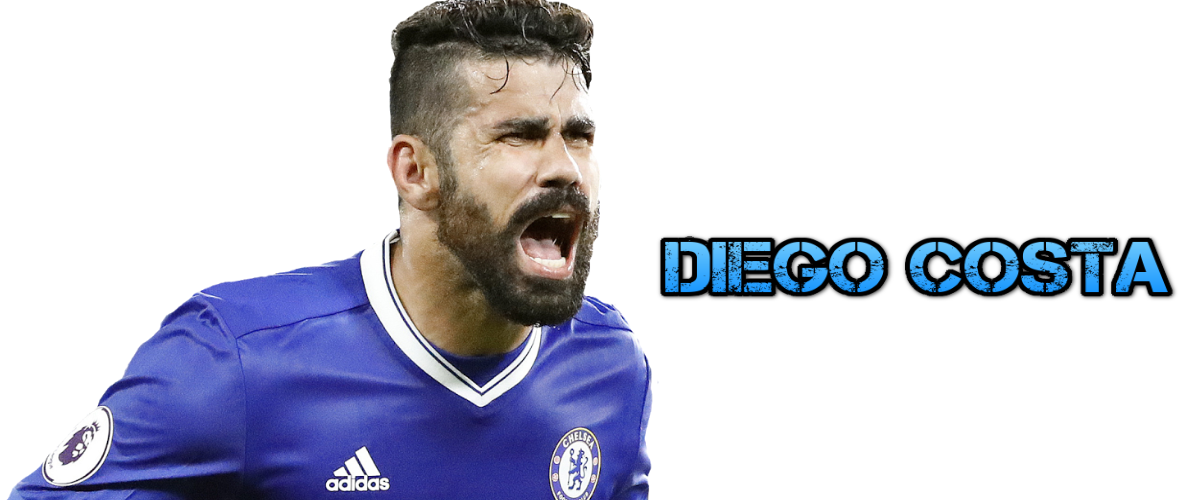 |
| Diego da Silva
Costa is a Spanish professional footballer who
plays as a striker for English club Chelsea and the
Spain national team.He has been described by pundits as
a talented striker whose main attributes are his
physicality, goal scoring and ability to keep
possession.Costa has been criticized and punished for
several confrontations with opponents. He began his career with Braga and Penafiel in Portugal, and was signed by Atlético Madrid in 2007. He was loaned back to Braga, and then to Celta de Vigo and Albacete before being sold to Real Valladolid in 2009. He returned to Atlético the following season and went on to play a key role in their attack, scoring 27 goals as they won the league title in 2014, and then joined Chelsea for £32 million. He scored 21 goals in his first season in England, winning the Premier League and League Cup. Internationally, Costa played twice for his native Brazil in 2013, but later declared his desire to represent Spain, having been granted Spanish citizenship in September 2013. He made his debut for his adopted nation in March 2014, and represented them at the 2014 FIFA World Cup. |
| S t y l e o
f p l a y |
| Friends and family
recalled how Costa's style of play changed little over
time, with his father stating how as a child, Costa
would be furious whenever his team lost. Atlético scout
Javier Hernández, on watching 17-year-old Costa play for
Penafiel, was impressed by the young forward's
determination and power, although found it evident that
he was not observing a healthy lifestyle. Costa's
Penafiel manager Rui Bento, who was at Sporting CP when
Cristiano Ronaldo broke into the team, rated Costa in
the same calibre as the Portuguese winger.According to
Atlético director Jesús García Pitarch, Costa ranks as
one of the best signings of his career, alongside
Mohamed Sissoko, Miranda and Ricardo Oliveira. While on loan at Celta de Vigo, Costa drew comparisons to their former Egyptian striker Mido, who was also known for his temper. During his spell at Albacete, Costa was nicknamed after bullfighter Curro Romero and the Tasmanian devil. His manager Juan Ignacio Martínez conceded that Costa played as a model professional for 89 minutes per match, with only one minute per match being his downfall.Costa refers to José Luis Mendilibar as his greatest manager because of his fatherlike "tough love", respecting his talents while keeping strict discipline, once sending Costa to work in a vineyard as a punishment. Earlier in his Atlético Madrid career, Costa's physical play was used in support of Radamel Falcao, thus ensuring a lower goalscoring rate. After Falcao was sold in 2013, the attack was restructured around Costa by manager Diego Simeone. Simeone, who like Costa was known for his competitiveness and aggression, found ways to enhance his discipline while retaining his determination. Ahead of his competitive debut for Chelsea in August 2014, BBC Sport pundit Robbie Savage described Costa as "the missing piece in the jigsaw" for the "clear favourites" who "could end up winning the title by five or six points". He explained that Chelsea's defence was already the strongest in the league, but a poorer rate of shot-to-goal conversion had cost them the title. He praised Costa's stature and physical style of play which "suits the Premier League down to the ground" in the same role that Didier Drogba previously played at Chelsea, an opinion also voiced by the league's top scorer of all-time, Alan Shearer. Costa has also been attributed with a greater ability to keep possession of the ball than any Chelsea striker since Drogba first left the club in 2012. |
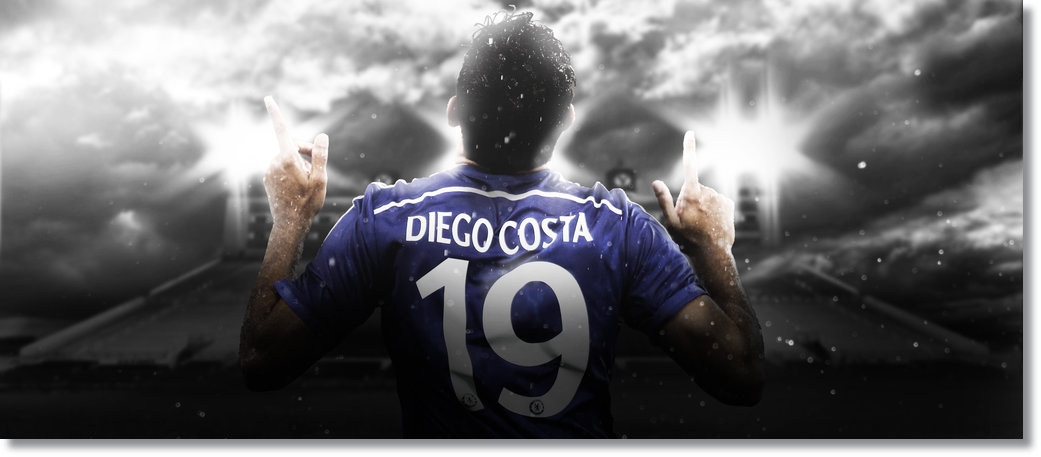 |
| E a r l y L i f
e |
| Costa was born in
Lagarto, Sergipe, Brazil, to parents José de Jesus and
Josileide. His father named him in honour of Argentine
footballer Diego Maradona despite the rivalry between
the two nations, and he has an elder brother named Jair
after Brazilian player Jairzinho. Despite regularly
playing street football, Costa did not believe as a
child that he would turn professional, in part due to
the remote location of his hometown.He has since set up
a football academy in his hometown, where he pays all
the costs. Costa is a fan of Palmeiras. Costa trialled unsuccessfully at his hometown team Atlético Clube Lagartense. At age 15, he left Sergipe and moved to São Paulo, to work in the store of his uncle Jarminho.Although he was never a professional, Jarminho had connections in football and recommended his nephew to Barcelona Esportiva Capela, a team from Ibiúna in the south of the city set up as an alternative to drugs and gangs for youth of the favelas. Before joining this team, he had never been coached in football. He turned professional at the club, earning around £100 per month, and competed in the under-18 Taça de São Paulo despite a four-month ban for slapping an opponent and dissent towards the referee. Although he was sent off in the first game of the tournament, he attracted the attention of renowned Portuguese agent Jorge Mendes, who offered him a contract at Braga. Costa's father was apprehensive of sending his son to Europe, and suggested he instead sign for nearby Associação Desportiva São Caetano, but he was adamant that he would take the opportunity. Jair played on the same team as Diego, and was a slimmer, more technically able player, but had less focus; the two were often not fielded at the same time in order to prevent arguments. He never turned professional, but had a three-month trial at Basque club Salvatierra. |
| C l u b C a r e e r |
| Costa signed for his
first European club in February 2006, Portugal's Braga.
He initially struggled with loneliness and the
comparatively cold weather of northern Portugal.Out of
action due to the club's lack of a youth team, he was
loaned that summer to Penafiel in the second division,
managed by former Portugal international Rui Bento, who
desired the "rough diamond". Through his negotiations with Spain's Atlético Madrid, Mendes arranged Costa's transfer for €1.5 million and 50% of the player's rights in December 2006, but he remained on loan at Braga until the end of the season. Atlético defeated interest from Porto and Recreativo de Huelva for Costa's signature, with director Jesús García Pitarch admitting that it was a risk to pay so much for an inexperienced player. After 5 goals in 13 games for Penafiel, he was recalled to Braga in January 2007. On 23 February, he came on in the 71st minute for Zé Carlos and scored his first goal for the team, a last-minute goal for a 1–0 win at Parma to advance 2–0 on aggregate to the Last 16 of the UEFA Cup. His season ended after seven games due to a metatarsal injury which ruled him out for six months. Costa was presented by Atlético Madrid president Enrique Cerezo on 10 July 2007 as "the new Kaká". While scout Javier Hernández wished for him to return to fitness in the club's reserves, García Pitarch instead suggested loaning Costa out immediately. He made his debut on 11 August in the Ciudad de Vigo tournament against Celta de Vigo, replacing Simão at half-time in a penalty shootout victory. |
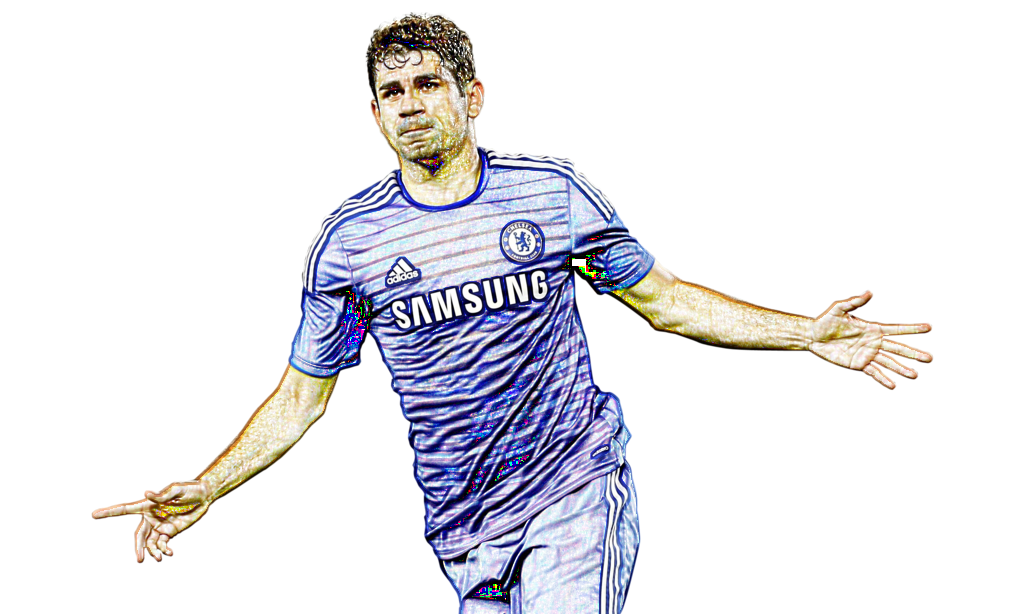 |
Towards the middle of the season, he was involved in two further controversies: he struck Málaga defender Weligton in the head, causing an injury which required medical stitches, and was sent off against Sevilla Atlético for diving and dissent, leaving his team to fight for a draw without him. The loyal strike partner of Quincy Owusu-Abeyie despite the pair not sharing a common language, he was dropped for Cypriot Ioannis Okkas. On 23 March 2008, Costa scored both Celta goals in a 2–1 win at Numancia, the latter after a long dribble but later on in the campaign, he was sent off against Tenerife at Balaídos, after which Celta went from winning 2–0 to drawing 2–2. The team barely avoided relegation, and Costa earned a reputation for being a disruptive influence. |
He initially threatened to terminate his deal with the Castile-La Mancha team, on account of the quality of his teammates and the city's lack of a beach. Nine days after signing, he scored a late winner in a 2–1 victory over Sevilla's reserves at the Estadio Carlos Belmonte. The Queso Mecánico suffered with financial problems during Costa's loan, with him threatening to strike unless their non-playing staff were paid in full. He was dropped to the bench by manager Juan Ignacio Martínez for the home game against Real Sociedad on 13 December as punishment for an argument with goalkeeper Jonathan, but came on as a substitute to score another late winner. Costa was known for misbehaviour on and off the pitch while at Albacete. He was sent off away to Tenerife, after which he slandered the referee's mother and confronted his opponents. He pulled practical jokes on his teammates and employers, earning him the moniker "that fucking Brazilian". However, he was a central figure as they avoided relegation, assisting twice in a 3–0 win at high-flying Rayo Vallecano on 2 May 2009, despite missing a penalty. |
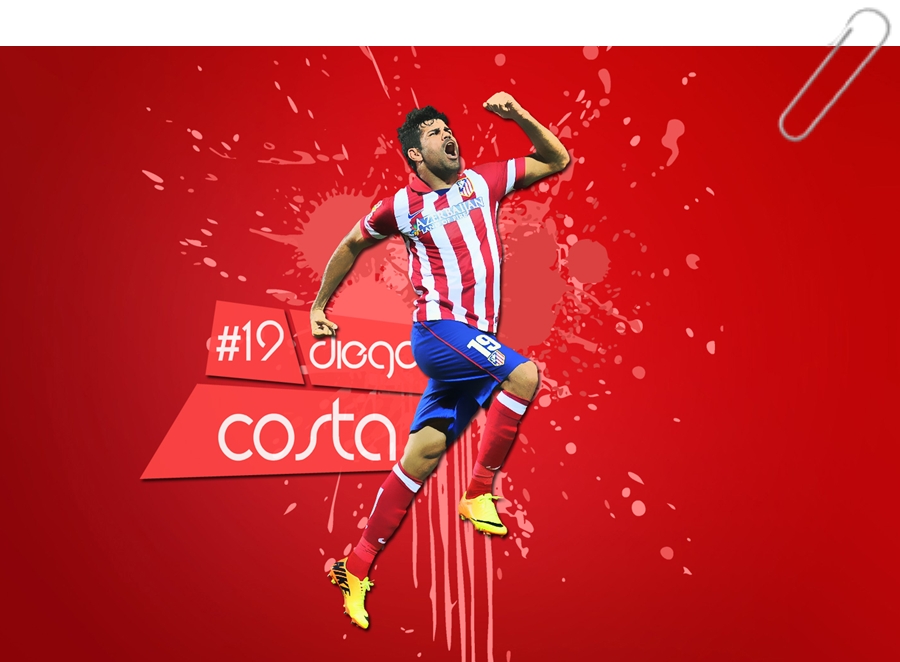 |
On 8 July 2009, Costa was sold to Real Valladolid as part of the deal that sent goalkeeper Sergio Asenjo in the opposite direction, with the transfer including a €1 million buy-back option that could be activated by Atlético at the end of the season. García Pitarch confessed that there was a verbal agreement that Costa would definitely return at the end of the campaign, and that the deal had been made to look permanent in order to give Costa more commitment to his new club. Initially, Costa had competition up front from fellow new signings Alberto Bueno and Manucho, signed from Real Madrid and Manchester United respectively; he eventually forged a friendship with the latter, a fellow lusophone, from Angola. He started strong for the Castile and León side, scoring 6 times in his first 12 games, but only found the net once in the following five-and-a-half months as the campaign eventually ended in relegation from La Liga. He was sent off in a goalless draw against Espanyol on 24 March 2010 for a stamp on Dídac Vilà in the first half. |
On 22 October 2013, Costa marked his UEFA Champions League debut with two goals against Austria Wien, the first coming after a fine individual effort in an eventual 3–0 group stage away win. On 19 February 2014, in the first knockout round's first leg, he scored the game's only goal at Milan, netting seven minutes from time after a corner kick from Gabi he added a further two in the second match, helping to a 4–1 victory that put Atlético into the quarter-finals for the first time in 17 years. On 30 April 2014, Costa won and converted a penalty in the second leg of the Champions League semi-final against Chelsea, as Atlético won 3–1 at Stamford Bridge and advanced to the final of the competition for the first time since 1974. He finished the league season with 27 league goals to become the third highest scorer, and the team won the title for the first time since 1996, but he was substituted after 16 minutes of the last match of the season against Barcelona due to a hamstring injury. Atlético sought to cure this injury before the upcoming Champions League final against Real Madrid by sending him to Belgrade for treatment with a horse placenta,and he was included in the starting line-up for the decisive match. However, he left the pitch after eight minutes in an eventual 1–4 loss; manager Diego Simeone later admitted a personal mistake in selecting the player to start the final despite his recent injury. Costa scored eight goals during the Champions League campaign, equalling the record held by Vavá since 1959 for most in a season by an Atlético player, and in his entire career was in the top ten Atlético players by goal average. At the season's LFP Awards, he was nominated for the league's Best Forward, losing out to Cristiano Ronaldo. |
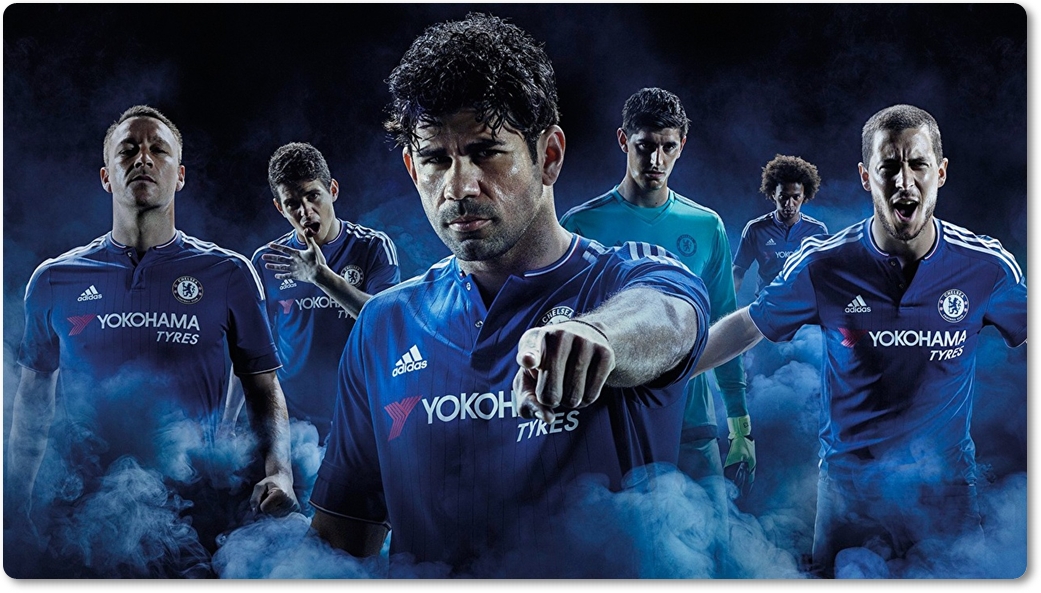 |
On 15 August 2016, Costa scored a late winner against West Ham United to give Chelsea a 2–1 win in their season opener.During the match, he caught opposing goalkeeper Adrián with a late challenge when already on a yellow card, but did not receive a second yellow and went on to score the winner; Adrián stated after the match that he was fortunate not to be seriously injured. In Chelsea's next match, away to Watford, Costa scored a winner once again in the final few minutes, giving his team another 2–1 victory. Two goals against Swansea at the Liberty Stadium and a consolation goal in a 2–1 home defeat against Liverpool left him with five goals from his first five league games. On 15 October, he scored in a 3–0 over reigning Premier League champions Leicester City, and on 20 November Costa became the first player to reach ten league goals for the season, with the only one of the game at Middlesbrough.With two goals and two assists for league leaders Chelsea, he was voted Premier League Player of the Month for the second time in November 2016, with his manager Antonio Conte picking up the equivalent.In January 2017, Costa fell out with Conte and was dropped from the team, amidst interest from the Chinese Super League. A potential move to Tianjin Quanjian F.C. was curtailed by the league limiting the number of foreign players in each team. He returned to Chelsea's starting line-up on 22 January, opening a 2–0 win over Hull City, his 52nd goal on his 100th appearance. |
| I n t e r n a t i o n a l C a r e e r |
|
In the first match of the tournament, against the Netherlands, he again won a penalty, conceded by Stefan de Vrij and converted by Xabi Alonso for a 1–0 lead but in an eventual 1–5 defeat he was booed by Brazilian fans during the match, to which he reacted by saying, "I have confirmed that Spain is my country and the Spanish people are behind me, the criticism of my decision does not affect me." Costa then started in a 0–2 loss to Chile making little impact as he was substituted for Fernando Torres for the second consecutive match, and Spain were eliminated. He was an unused substitute in the team's third match, a 3–0 defeat of Australia. Costa scored his first goal for Spain with the third in a 4–0 UEFA Euro 2016 qualifying win away to Luxembourg on 12 October 2014. He did not feature again for Spain until 5 September 2015, when he was fouled by Slovakia goalkeeper Matúš Kozáčik for a penalty, which Andrés Iniesta converted for a 2–0 qualifying win at the Estadio Carlos Tartiere in Oviedo. He was booed when he was substituted for Paco Alcácer later in the match. Del Bosque defended Costa from criticism, saying that he performed well against the Slovak defence. However, he was not included in the final squad for the tournament.On 5 September 2016, Costa scored his first international goals for nearly two years, in an 8–0 win over Liechtenstein at the Estadio Reino de León for Spain's opening match of 2018 World Cup qualification, the first being a header from a free-kick by his former Atlético teammate Koke. |
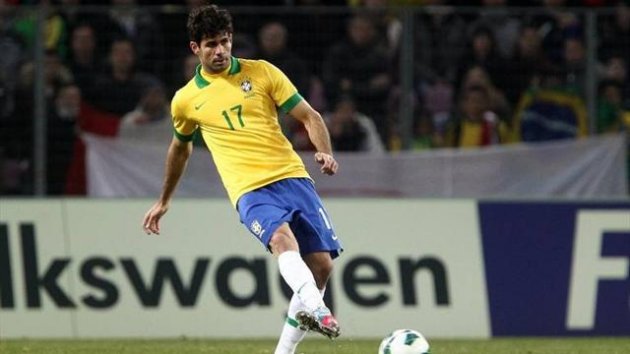 |
| Remark: Read More about soccer betting online at Sbobet |